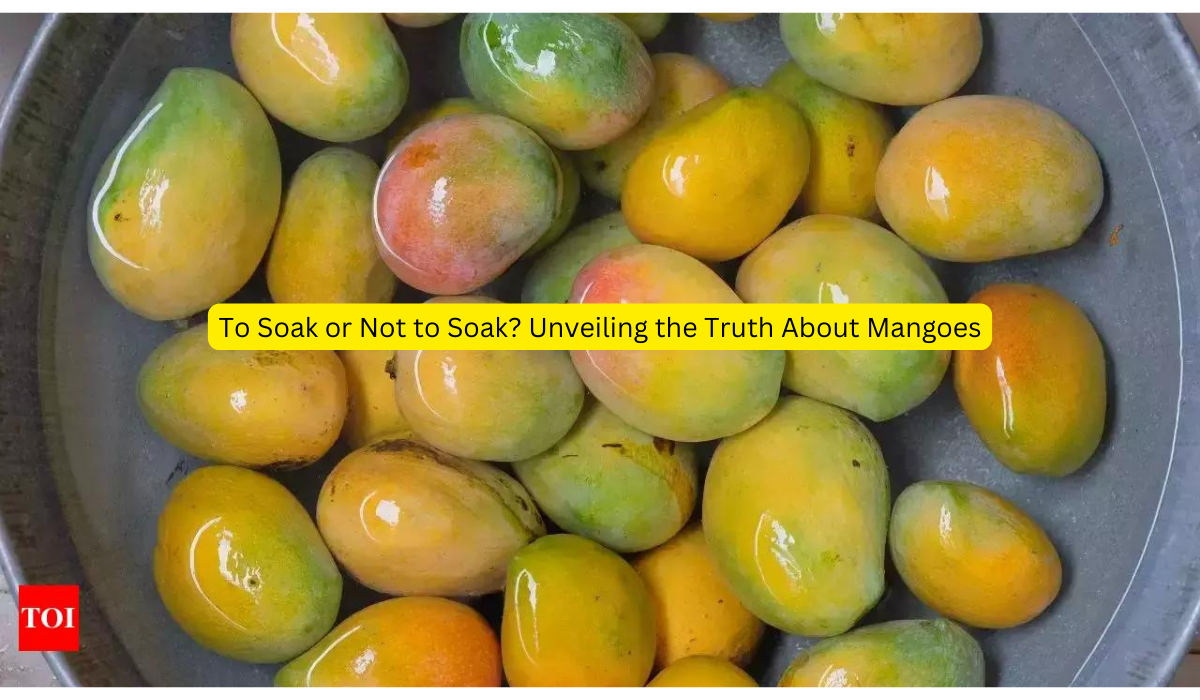Ah, mangoes! The king of fruits, dripping with juicy sweetness and sunshine flavor. But before you dive into that deliciousness, a question might linger: should you soak mangoes before eating? Tradition often dictates a pre-soak, but is there any real benefit to this practice? Let’s peel back the layers (pun intended) and explore the reasons for and against soaking mangoes.
Potential Benefits of Soaking Mangoes
There are several reasons why soaking mangoes is a common practice, particularly in some cultures. Here’s a closer look at some of the purported benefits:
- Reduced Phytic Acid: Mangoes, like many other fruits and nuts, contain phytic acid. This natural compound can bind to minerals like iron and zinc, potentially hindering their absorption by our bodies. Soaking can help leach out some of the phytic acid, potentially improving mineral absorption. Think of phytic acid like tiny handcuffs on minerals – soaking loosens the grip, allowing your body to access those nutrients more easily.
- Improved Digestion: Some people believe soaking softens the fiber content in mangoes, making them easier to digest and potentially reducing discomfort. Imagine your digestive system as a busy highway – softened fiber might be like smaller vehicles that move more smoothly through traffic.
- Reduced “Heat”: In some cultures, the concept of “heat” in food is associated with potential digestive issues or skin problems. Soaking mangoes is believed to reduce this “heat” and make them more cooling for the body. While the science behind this concept is less clear, it’s a deeply ingrained belief for some.
- Pesticide Removal (Maybe): Soaking can potentially remove some surface-level pesticide residue, but it’s not a guaranteed method. Washing your mangoes thoroughly under running water remains the most effective way to remove pesticides.
The Other Side of the Coin: Reasons Not to Soak
While soaking has its proponents, there are also reasons why you might skip this step:
- Limited Nutritional Impact: The amount of phytic acid leached out through soaking might be relatively low. Additionally, cooking methods like boiling can also reduce phytic acid content. So, unless you have concerns about mineral absorption, soaking might not be a huge necessity.
- Loss of Nutrients: Soaking can leach out some water-soluble vitamins and minerals along with the phytic acid. Think of it like throwing the baby out with the bathwater – you might lose some good stuff too.
- Flavor and Texture: Soaking for extended periods can dilute the vibrant mango flavor and soften the texture. If you love the intense sweetness and firm flesh of a perfectly ripe mango, soaking might not be your friend.
Ultimately, the decision to soak mangoes comes down to personal preference.
The Verdict: Soak It Up (or Not)
There’s no right or wrong answer when it comes to soaking mangoes. Here’s a quick guide to help you decide:
- Soak for Potential Mineral Absorption: If you’re concerned about maximizing mineral absorption, a short soak (30 minutes) might be worthwhile.
- Skip the Soak for Flavor and Texture: If you prioritize the full-on mango experience – bold flavor and firm flesh – enjoy it as is.
- Soak for Digestion (Maybe): If you find mangoes sometimes cause digestive discomfort, a brief soak might offer some relief. However, this isn’t a guaranteed solution.
Remember, thoroughly washing your mangoes is always crucial, regardless of soaking.
Conclusion: The Choice is Yours!
So, should you soak your mangoes? It’s entirely up to you! Experiment and see what works best for your taste buds and digestive system. Whether you choose to soak or savor them straight-up, enjoy the juicy goodness of these magnificent fruits!
FAQs: Mango Soaking – Your Questions Answered
Here are some additional questions you might have about soaking mangoes:
1. How long should I soak mangoes?
Soaking times can vary depending on your goals. For potentially increased mineral absorption, 30 minutes might suffice. If you’re hoping to soften the fiber for digestion, you can soak for up to an hour. However, longer soaking times can affect flavor and texture.
2. What water temperature should I use for soaking?
Room temperature water is perfectly fine. Hot water might accelerate the leaching process but could also negatively impact flavor and texture.
3. Do I need to soak all types of mangoes?
Soaking practices often vary by region and mango variety. Experiment and see what works best for your preferred type of mango.
4. Can I soak dried mangoes?
Soaking dried mangoes can help rehydrate them, but it won’t have the same effect on phytic acid content as soaking fresh mangoes.

